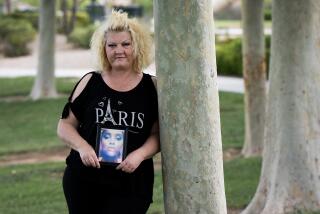Judge Hears Final Arguments in Murder Trial
- Share via
“Murder--Whatdunit.”
“The Perfect Crime.”
“The Anarchist’s Cookbook.”
“The Joy of Cold Revenge” and “The Revenge Book.”
Why would someone have those books, books detailing how to kill without getting caught, unless they were going to murder someone, prosecutor Larry Burns argued during closing statements Thursday in the murder trial of David Scott Harrison.
Harrison is accused of first-degree murder in the Feb. 17, 1988, killing of his ex-wife, Anne Jenkins, one month after she and her new husband, Gary Jenkins, won $727,000 in the California Lottery.
“Our society rewards success,” Burns said. “But there is one form of success for which this society has no reward . . . for the one who kills their victim and leaves no physical evidence.”
“That is the reward that David Harrison is seeking in this case for his success in murdering Anne Jenkins and leaving no evidence of his crime at the scene,” said Burns, who concedes he has no evidence placing Harrison at the scene.
But defense attorney Alan May, in beginning his closing argument, accused Burns of playing “a shell game” with testimony.
May also argued that Burns was trying to turn from the presumption of innocence to “guilty until proven innocent.”
“Mr. Burns is saying, ‘(Harrison) is trying to get away with the perfect crime and that’s why we have no (direct) evidence. If you find him not guilty, you are rewarding him for the crime, so assume him guilty,’ ” May told the judge, who is deciding the non-jury trial. “But that’s not the law.”
The defense will finish its closing arguments today, and Judge David B. Moon is expected to deliver a verdict immediately afterward.
In Burns’ closing, he detailed the stormy relationship between Jenkins and Harrison since their 1982 divorce: Constant court battles over custody of their two children and alimony, Harrison’s bombing of the van belonging to Gary Jenkins’ first wife, and Harrison’s constant harassment of Jenkins, her husband and her father.
“He indeed had a motive to kill Anne Jenkins on the day she was killed . . . and he alone had such a motive,” Burns said, as Harrison sat, his head on his hand, eyes closed. “In this case, the motive was overwhelming . . . and that motive was (at its) pinnacle on the day she was killed.”
Burns said Harrison’s actions between the time of their divorce and the killing demonstrated an escalation of violence against Jenkins and her family, and he maintained the surge followed the books on violence that Harrison owned.
“It starts with petty, sophomoric pranks, and it escalates to more severe things, to bombings,” Burns said.
Burns depicted the slightly built Harrison as “someone fascinated with murder,” “an inveterate liar” and having “an insatiable desire . . . to punish Anne Jenkins . . . to beat down his wife.”
“The usual motives have been ruled out,” Burns said, noting that there was no sign of burglary, robbery or sexual assault. “There is no explanation for this crime. If not David Harrison, pray tell, who did this?”
Harrison had the means to kill, too, Burns contended, pointing out the collection of how-to books on committing crimes that Harrison tried to hide three days before the killing took place.
Burns accused Harrison of trying to commit “The Immaculate Murder,” a chapter in one of the books.
“But he bungled it. He made aspirations to the perfect crime, but he made mistakes,” Burns said. “He talked too much afterwards. He thought he was committing the perfect crime, but he failed.”
Burns pointed out that three days before the killing Harrison had told a good friend to “watch the news, something big is going to happen.”
“That is the most salient piece of evidence in this case, aside from the bag (of books on murder),” Burns said. “What was he predicting? What was going to happen?”
“It’s all consistent. The seeds that were sown four, five years ago came to fruition in February of 1988.”
In May’s closing, however, he argued that by that time, the things that made Harrison hate Jenkins, the custody and alimony battles, had been resolved and Harrison had nothing to gain through the murder.
“Why not just take the kids and run?” May said. “He may have wanted to kill her at some point. He may have talked about it at some point. But what did he have to gain?”
“At the time of the killing, he probably had less motive for killing than he had in five years.”
May also said that motives for Jenkins’ murder could be attached to several people.

